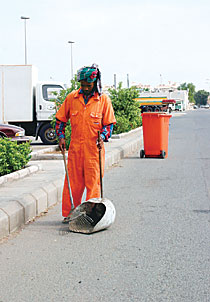MAKKAH, 24 November 2006 — Bengali street cleaners are some of the lowest paid workers in the Kingdom. With salaries as low as SR250 a month (about $67), their incomes are less than half of those of housemaids. In order to survive, much less send money back home, many of these workers resort to additional income sources, such as odd jobs, or even begging.
Adding to their miseries, some employers — private sub-contractors hired by the municipality — abuse these workers by withholding wages, sometimes for months, and at times indefinitely. Many street cleaners are illiterate or under-educated, unaware of their rights in the Kingdom. Often they live in fear of confronting their employers, living under the hope that someday they will get the money owed to them. Thus the cycle of abuse continues while the workers seek ways to adapt and survive.
Mezan, a Bangladeshi street cleaner in the holy city, said that in his spare time he works as a tea boy.
“I make tea, coffee, and clean offices and bathrooms,” he told Arab News. “I have to admit that this has affected my main job. I make a lot more money at my second job than I make doing my main job. Also I receive tips from the employees in the company.”
Mazen says he earns SR250 a month for cleaning streets and SR500 a month as an office tea boy, putting him at about the same salary as a domestic servant. (Workers at this level are typically provided room, board, a small food stipend, and some health coverage — this is how workers can survive for months without receiving their salaries from unscrupulous employers who are violating the law, in some cases with impunity.)
Izad, another Makkah street cleaner, said that not only is the salary very low but the company is also delaying the payment. In order to try to come up with some money, he often cleans streets at busy intersections where he can try to get sympathy from drivers and passengers.
Shuwman, also a Bangladeshi street cleaner, said that his company has delayed his payments for “many months”. In order to find a source of income he offers to clean houses, carry groceries, refill domestic gas cylinders, or any other odd job. He said that he has been able to generate about SR600 a month through these efforts.
Street cleaner Muhilldeen says he washes cars for extra income, earning about SR50 a month per car. He says that he works more while cleaning cars than streets, but is rewarded appropriately: He makes about SR2,000 a month washing cars, nearly ten times his income from his main job.
“Delaying our payments, which is a common thing by these contractors, compels us to find work that pays adequately and as promised,” he said.
A source in Makkah municipality told Arab News that the municipality is supervising the company in charge of cleaning the Holy City. “
These workers have agreed to the contract, the contract states that their salaries are SR250 and that the company will provide them with food and accommodation,” said the source, adding that the city doesn’t tolerate people begging around the Grand Mosque.
Mansour Al-Otaibi, head of the Passport Department in Makkah (in charge of enforcing immigration law) said that any company that employs workers taking on extra jobs is violating the law.
But so, too, are those companies that withhold or delay payments to unskilled, low-income workers. As the Hadith goes: Pay the laborer before the sweat on his brow dries.










